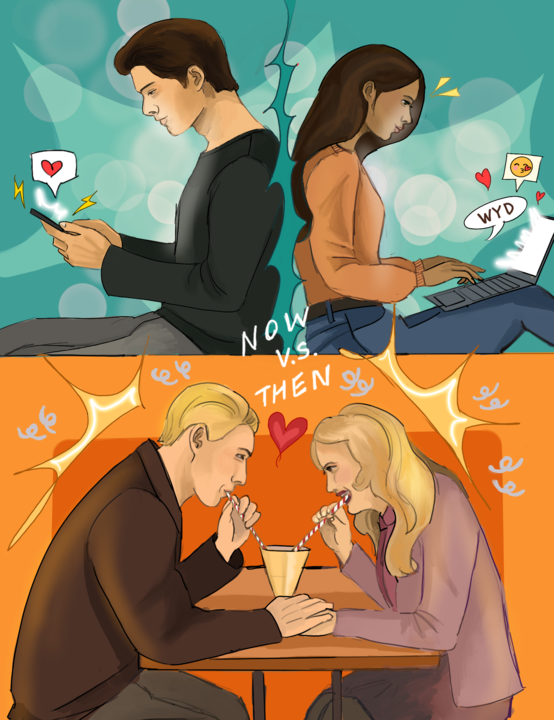Amid a hookup culture full of situationships, sneaky links and friends with benefits, many teens wonder if they can find stable and loving relationships like previous generations did.
Regardless of how relationships work in any generation, though, child and teen therapist Dr. Candace Pierce said romantic relationships are a big part of adolescence. “Younger teens can sometimes get very roped into a romantic relationship and kind of give up school and everything else,” Pierce said. “As teens get older, they still can do that. Some people do it if they don’t have enough of an identity in high school to ground themselves.”
With relationships being integral to a person’s identity, early childhood and adolescent development teacher Hilary McDaniel said the volatile nature of teenage relationships can often have negative impacts.
“I think what teens have a really hard time with is having relationships without drama,” McDaniel said.“Sometimes they’re just so drawn to it. (Teenagers should) have the courage to say what they want and need without all the extra drama.”
Yet, teenage relationships weren’t always this complicated. McDaniel said technology has significantly changed younger generations’ communication and their relationships.
“When I was growing up, we had to call people on the phone, and even then our parents were like, ‘Don’t do it over the phone. Do it in person,’” McDaniel said. “Now it is not even about calling them on the phone. It’s texting. There’s so much that is lost. Over the phone, you can’t read body language, and over text, you can’t read tone of voice.”
No matter what form it comes in, sophomore Maria Uribe said communication is everything when it comes to high school relationships.
“A lot of high school relationships end because people don’t know how to talk about their feelings or set boundaries,” Uribe said. “I think that a lot of people also isolate themselves from their friends when they get into a relationship, which I think isn’t healthy at all. And honestly, most high school relationships don’t last forever, so it’s important to enjoy the moment but not let it take over your entire life.”
In addition to technologies, Pierce said the pandemic also impacted the nature of current teenage relationships.
“I feel like teens that have gone through it, in some ways, are maybe trying to make up for lost time,” Pierce said, “There might be a greater need to have relationships because there was this huge amount of time that people missed out on being social.”
An unexpected difference, McDaniel said, is this generation of teenagers are statistically less sexually active than their parents’ generation during adolescence.
“A lot of people would say that it’s a good thing,” McDaniel said. “I’m not sure that it is, in the sense that, does that mean more teenagers are watching porn? And if they are watching porn, does that mean that they are exposing themselves to unhealthy perceptions of what sexual relationships should look like, and then does that lead to unhealthy views of what relationships look like?”
But Uribe said there are also other reasons for teens delaying sexual activity.
“People are a lot more focused on school, and careers now,” Uribe said. “People aren’t really looking for a high school sweetheart and save those thoughts for college.”
In comparison to this generation, Pierce said older generations had more long-term high-school relationships.
“To find somebody in high school and then keep that relationship and say, ‘I married my high school sweetheart.’ Well, I don’t know that that happens very much anymore,” Pierce said. “But I think it could have happened when the parent’s generation were teenagers.”
Because of more casual high school relationships and a growing acceptance to talk about it, McDaniel said hookup culture has been on the rise.
“I think that the difference is, with the whole sex-positive movement and the pushback against slut-shaming, there is maybe more openness about hookup culture amongst high school students,” McDaniel said.
Pierce also said hookup culture was previously scorned, but is now more positively perceived.
“There was a lot more judgment about it back then, more than there is now, certainly by peers and some parents,” Pierce said.
While people complain about the toxicity of informal relationships, McDaniel said she wonders if younger generations will succeed in finding genuine intimacy. But society may be moving the needle.
“Maybe (true intimacy) is not the goal anymore,” McDaniel said. “Maybe systems are changing. There is some data that suggests that unmarried women without children are the happiest group. The inverse is true for men, though. So that’s gonna come into clash.”
As societal norms shift and evolve, McDaniel said relationships will remain a key factor in adolescent development. Relationships having adapted already from the parents’ generation to current teens, Pierce said no one knows what the future will hold for hookup culture and true love alike.
“I feel like there’s some sense on the part of young people now that the world is just a less safe place,” Pierce said. “There’s not as much time to do things the oldfashioned way. And maybe people feel like they just need to take pieces of life as they come no matter if it’s the traditional way or not.”


